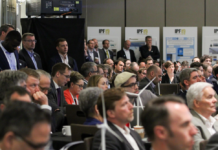The Massachusetts Department of Energy Resources (DOER) has appointed two regional coordinators for the Green Communities Program. The officials will help areas in central and southeastern Massachusetts qualify for grants and achieve municipal energy goals.
Kelly Brown was named Central regional coordinator for DOER's Green Communities Division, and Seth Pickering was named Southeast regional coordinator for the program.
Brown and Pickering complete the Green Communities regional team, joining Joanne Bissetta and James Barry, who began serving as Northeast and Western regional coordinators, respectively, in August.
‘Working in their respective regions, Kelly and Seth will provide hands-on, locally focused guidance and assistance as Central and Southeastern Massachusetts communities partner with the [Gov. Deval] Patrick administration in pursuit of a clean energy future,’ says DOER Commissioner Phil Giudice.
DOER's four regional coordinators will work with the department's Green Communities Division and other DOER staff to implement grant programs and provide technical assistance on programs such as energy audits, energy performance contracting, and energy information reporting systems.
The coordinators will also provide guidance on local renewable energy and energy efficiency projects funded through the Energy Efficiency and Conservation Block Grants announced by the Department of Energy as part of the federal stimulus package.
Regional coordinators will assist cities and towns in meeting five benchmarks to become Green Communities – a designation that enables them to qualify for up to $10 million in Green Communities grants expected to be announced later this year.
To qualify for these grants, which are funded with proceeds from the auction of carbon allowances under the Regional Greenhouse Gas Initiative, communities must do the following:
– adopt a local zoning bylaw or ordinance that allows as-of-right siting of renewable energy projects – siting that does not unreasonably regulate these uses;
– adopt an expedited permitting process related to the as-of-right facilities;
– establish a municipal energy use baseline and establish a program designed to reduce baseline use by 20% within five years;
– purchase only fuel-efficient vehicles for municipal use, whenever such vehicles are commercially available and practicable; and
– require all new residential construction over 3,000 square-feet and all new commercial and industrial real estate construction to reduce life-cycle energy costs.
SOURCE: Massachusetts Executive Office of Energy and Environmental Affairs



